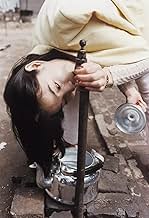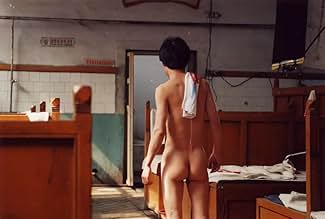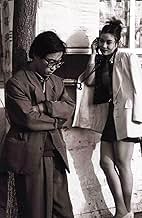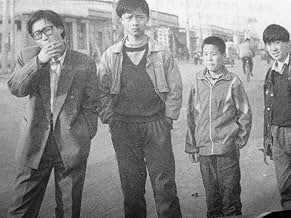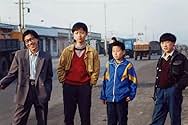NOTE IMDb
7,4/10
3,5 k
MA NOTE
Ajouter une intrigue dans votre langueA small town pickpocket whose friends have moved on to higher trades finds himself bitter and unable to adapt.A small town pickpocket whose friends have moved on to higher trades finds himself bitter and unable to adapt.A small town pickpocket whose friends have moved on to higher trades finds himself bitter and unable to adapt.
- Réalisation
- Scénario
- Casting principal
- Récompenses
- 7 victoires et 1 nomination au total
Histoire
Le saviez-vous
- AnecdotesJia Zhang-ke: the man sent by Xiao Yang to return Xiao Wu's wedding present.
- ConnexionsReferenced in Plaisirs inconnus (2002)
Commentaire à la une
"This is a film about our worries and our uneasiness. Having to cope with a dysfunctional society, we take refuge in solitude which is a substitute for dignity
It is finally a film about my native town and about contemporary China." - Jia Zhangke
A sense of longing permeates Xiao Wu, a 1997 film by the acclaimed independent Chinese director Jia Zhangke (Platform, Unknown Pleasures). Set in Jia's home city of Fengyang in Shanxi province, the film is basically a series of incidents in the life of petty thief and pickpocket, Xiao Wu. It is a compelling portrait of an individual in free-fall and, like other films by the director, shows the corrupting influence of Western values on an entire generation of Chinese. The film is reminiscent of the works of Robert Bresson in its use of non-professional actors, environmental sound, and in its spare cinematography by Yu Lik-Wai.
Xiao Wu (Hong Wei Wang) wanders about aimlessly with lots of money to spend and little to spend it on except call girls at the local karaoke bar. He befriends Mei Mei (Hao Hongjian), and they start to develop a tentative relationship but his social awkwardness leads to ultimate rejection. Wu's friends have given up the life of crime and do not want to have anymore to do with him. His best friend, Jin Xiao Yong has just been voted a "Model Entrepreneur" for his activities in cigarette trafficking and does not invite Wu to his wedding. He even returns Wu's gift of money because it is "tainted". The scene between the two old friends discussing the wedding is heartbreaking in the look of rejection on Wu's face.
With no other work to fall back on, Wu is forced to continue his petty crimes, constantly running afoul of the police. In the background, the government has issued an order to round up street criminals. Wu seems bewildered by the fact that his friends do not want to associate with him and he is unable to grasp the meaning of the police crackdown. He grows increasingly alienated and lonely as he loses his friends who go straight, his girl friend Mei Mei who leaves town, and his family who eject him after an argument over a ring.
Jia captures the rhythm and feel of day-to-day life in Fengyang. This is life as it is actually lived, not as a series of dramatic events forced into a narrative structure. His film succeeds not only as social commentary but also as an acutely perceptive realization of the psychology of a self-absorbed individual. One of the most revealing scenes is when Wu stubbornly refuses to sing with Mei Mei at the karaoke bar but instead goes to a bathhouse and, alone and naked, sings a plaintive song to the empty room. After Mei Mei leaves him, things seem to spiral downward for Wu. In a final sequence, he is shown after his arrest, not as a victim or hero, but as an off-screen object to be gazed at and mocked by people in the street. It is a scene of personal tragedy, but in the universality of its compassion, it becomes a spiritual revelation. Xiao Wu is one of the best films of the 90s.
A sense of longing permeates Xiao Wu, a 1997 film by the acclaimed independent Chinese director Jia Zhangke (Platform, Unknown Pleasures). Set in Jia's home city of Fengyang in Shanxi province, the film is basically a series of incidents in the life of petty thief and pickpocket, Xiao Wu. It is a compelling portrait of an individual in free-fall and, like other films by the director, shows the corrupting influence of Western values on an entire generation of Chinese. The film is reminiscent of the works of Robert Bresson in its use of non-professional actors, environmental sound, and in its spare cinematography by Yu Lik-Wai.
Xiao Wu (Hong Wei Wang) wanders about aimlessly with lots of money to spend and little to spend it on except call girls at the local karaoke bar. He befriends Mei Mei (Hao Hongjian), and they start to develop a tentative relationship but his social awkwardness leads to ultimate rejection. Wu's friends have given up the life of crime and do not want to have anymore to do with him. His best friend, Jin Xiao Yong has just been voted a "Model Entrepreneur" for his activities in cigarette trafficking and does not invite Wu to his wedding. He even returns Wu's gift of money because it is "tainted". The scene between the two old friends discussing the wedding is heartbreaking in the look of rejection on Wu's face.
With no other work to fall back on, Wu is forced to continue his petty crimes, constantly running afoul of the police. In the background, the government has issued an order to round up street criminals. Wu seems bewildered by the fact that his friends do not want to associate with him and he is unable to grasp the meaning of the police crackdown. He grows increasingly alienated and lonely as he loses his friends who go straight, his girl friend Mei Mei who leaves town, and his family who eject him after an argument over a ring.
Jia captures the rhythm and feel of day-to-day life in Fengyang. This is life as it is actually lived, not as a series of dramatic events forced into a narrative structure. His film succeeds not only as social commentary but also as an acutely perceptive realization of the psychology of a self-absorbed individual. One of the most revealing scenes is when Wu stubbornly refuses to sing with Mei Mei at the karaoke bar but instead goes to a bathhouse and, alone and naked, sings a plaintive song to the empty room. After Mei Mei leaves him, things seem to spiral downward for Wu. In a final sequence, he is shown after his arrest, not as a victim or hero, but as an off-screen object to be gazed at and mocked by people in the street. It is a scene of personal tragedy, but in the universality of its compassion, it becomes a spiritual revelation. Xiao Wu is one of the best films of the 90s.
- howard.schumann
- 12 janv. 2003
- Permalien
Meilleurs choix
Connectez-vous pour évaluer et suivre la liste de favoris afin de recevoir des recommandations personnalisées
- How long is Pickpocket?Alimenté par Alexa
Détails
Box-office
- Montant brut mondial
- 1 569 $US
- Durée1 heure 45 minutes
- Couleur
- Rapport de forme
- 1.37 : 1
Contribuer à cette page
Suggérer une modification ou ajouter du contenu manquant

Lacune principale
By what name was Xiao Wu, artisan pickpocket (1997) officially released in Canada in English?
Répondre
